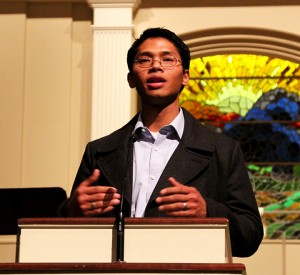

Monica Lake | Lariat Photographer
By Sierra Baumbach
Staff Writer
Christians crossed ethnic boundaries Thursday to explore how Waco churches serve immigrants in the community.
Only a few days after a bipartisan group of U.S. senators agreed on a way to overhaul the current immigration system, Calvary Baptist Church came together with 20 local churches during “God’s Heart toward Immigrants,” to challenge how immigrants were seen in the church.
“This is the first time we’ve brought all of our churches together,” Dr. Lydia Bean, assistant professor in the Honors College and Calvary Baptist Church representative, said. “We’ve talked to our own churches about immigration, but we wanted to gather collectively and cross the ethnic boundaries.”
The night’s speakers included reverends from local African-American-based churches and Hispanic-based churches, as well as immigrants who came to the U.S. from Singapore and Guatemala.
Naz Mustakim, an immigrant from Singapore, came to America when he was 13 years old and was detained for 10 months after a felony charge caused his green card to be revoked.
“I was detained in a detention center, and in that time I saw how being detained broke people’s lives,” Mustakim said. “I was sent to Mission Waco’s treatment center after I was convicted and although I was born Muslim, I found God then. Four years after I pled guilty to that charge, an officer came knocking on my door telling me that my green card had been revoked and that was when I was detained.”
Mustakim said that he wanted people to gain a different perspective from the ceremony.
“I want people to see that God sees immigrants as his children as well,” he said. “People say ‘we don’t like immigrants because they take our jobs, our economy is going bad,’ but God always provides and I want people to understand that God wants the best for everybody.”
Testimony was also given by the Rev. Herman Rodás, who came to the U.S. from Guatemala during a war when he was 17 years old.
“Many ask why we are here,” Rodás said. “I was forced to come to the U.S. in 1986. The guerillas had taken over so many places in the country, and the country needed soldiers. They didn’t ask if you wanted to be a soldier; they took you. Your chance of living in the war was 40 percent. Many of my friends became soldiers, and many of them came home in coffins. My parents said I needed to go to the U.S.”
Rodás said he would never forget the day he crossed the Rio Grande.
“It was Oct. 20. 1986. U.S. immigration took ahold of me and to my surprise, thanks to politics at the time, I could stay in the country,” he said. “But I was 17 with no parents to correct me or punish me; I got into drugs and alcohol. But a man spoke to me about Jesus, and he changed my life. It has been eight years since I’ve been a pastor and I understand the need of the Hispanics. Many of us can judge for ourselves why the Hispanics come to the U.S., but the U.S. is not ready to help us, to comprehend us. For some of us, we had to come here, or else we would have died.”
The Rev. Alan Bean, Friends of Justice Representative, said Latinos are overwhelming, in favor of compassion and comprehension of immigration reform, with 60 percent of Hispanics knowing someone who could be deported at any moment and a quarter of them knowing someone who has.
“Most of us in the Anglos community don’t know anybody who is in prison, we don’t know anybody who could be deported tomorrow,” Bean said. “And so our heads are confused because our hearts have gone cold. Friends of Justice speaks of a punitive consensus. Politicians disagree on many things. For the past three decades, the two major parties in the United States have been competing to see who can be the toughest on the undocumented and the incarcerated. Christians have begun taking their moral cues from secular politics and entertainment; we buy into the punitive consensus without even knowing we are doing it. Be not be conformed, be transformed by the doings of your mind”
The Rev. Frank Alvaredo, of First Spanish Assembly Church, said he could not relate to the immigrants at first but came to understand what it was to be an immigrant.
“I see the need,” Alvaredo said. “The tremendous need that is an everyday situation. There are people being deported and families being left behind. If we can join with the African-Americans, the Anglos, and do something more organized, we can do something great. We can make a difference in Waco.”
The service ended with the encouragement to participate in the “I Was a Stranger” challenge. A 40-day program that requests participants study one Bible passage pertaining to immigration a day and pray for the immigrants and the elected officials who make policies that affect them.





